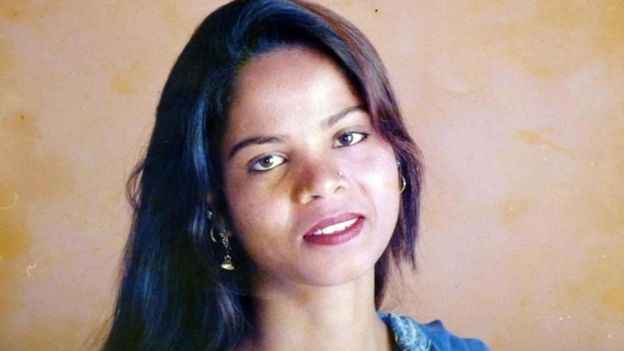
The Christian woman acquitted by Supreme Court from blasphemy case, hiding as she is not safe yet. Last week, the highest court of Pakistan uphold its last year’s judgment, in which the court acquitted Asia Bibi, a poor Christina women, who spent 9 years in solitary confinement, from false charges of blasphemy. Her legal battle has finished after 10-year, but she is still not safe as Muslim hardliners are after her and have publically declared her liable to death. Despite court’s final judgment, she is still hiding at an unknown place in Pakistan for safety.
By Aftab Alexander Mughal 9 February 2019
(9 February 2019) – Almost after a decade on 29 January, the Supreme Court of Pakistan removed the final hurdle against a Pakistani Christian woman’s freedom by upholding her acquittal judgment in a blasphemy case. The apex court acquitted Asia Bibi, a mother of five, from death penalty conviction last year on 31 October. Bibi spent nine years in solitary confinement. After the court’s judgement last October, the complainant Qari Muhammad Salaam, a local Muslim cleric, filed a review petition, which hindered Bibi to leave the country for safety. Finally on last Tuesday, the review petition was rejected while Bibi was absent from the court. The government took security measures to maintain law and order situation.
Asia Bibi, 47, was released from Multan jail last October, and she was taken to a protective custody by the police as hardliners conducted nation-wide violent protests against her release and issued fatwa (religious verdict) for her murder. She is still hiding in Pakistan, but her location remains secret as her life is still not safe in her own country. There are reports that the fanatics in Pakistan were going door to door to hunt her down. According to the media reports, she will leave Pakistan soon, and will join her daughters who left for Canada recently. It is expected that she will be granted political asylum by the Canadian government. Her defence lawyer, Saif-ul-Malook, a Muslim solicitor, also sought protection because he has been receiving death threats for defending Bibi in the court.
Asia Bibi, a labourer from a predominantly Muslim village in rural Sheikhupura, Punjab province, was arrested in June 2009 for committing blasphemy against Prophet Muhammad (PBUH), which she denies. In fact, she had a row with her co-workers (two Muslim sisters) for drinking water in the hot summer from the same glass as her Muslim co-workers. Later, Muslim women converted their personal rumpus into a religious fight. In 2010, she was convicted and sentenced to death by the trial court. The High Court upheld the death sentence. However, after many years’ legal battle, the country’s Supreme Court declared her innocent, and finally set aside her conviction last year.
Asia Bibi’s case is a high-profile case, which drew world-wide attention and highlighted the misuse of Pakistan’s controversial blasphemy laws. The laws were introduced in 1980s by a military dictator, General Zia-ul-Haq, who ushered rapid Islamisation and wanted to make Pakistan an Islamic state.
Blasphemy is a contentious issue, which causes violence and fear in the society. In 2011, a prominent Muslim Pakistani politician, Salmasn Taseer, Governor of Punjab province, was murdered by his own bodyguard, because he fought for the release of Asia Bibi and publically demanded amendments in blasphemy laws. In 2012, a Christian politician, Shahbaz Bhatti, government’s minister of minority affairs, was killed by Taliban, as he had been raising voice for the repeal of blasphemy laws. Stephen Cohen, a famous American scholar, said that it shows the symptoms of deep problems in Pakistan.
Blasphemy laws have been widely misused since their induction in Pakistan’s penal code. Anybody can blame anyone, and generally the lower courts don’t push for proof of the allegation. However, the situation becomes different in higher courts. In majority of those cases, members of religious parties, particularly Anjuman-e-Khatam-e-Nabuwaat (AKN), are complements. For example, one member of the AKN was complement in at least six cases alone.
Around 1,500 blasphemy cases were registered since 1980s, half of them against non-Muslims, who are only 3 percent of the total population of the country. Under the Section 295-C of penal code (of blasphemy law), blasphemy against Prophet Muhammad (PBUH) is a capital offence. Although, no one has been executed under this law so far, more than 72 accused people have been killed by the mob or fanatic individuals. Therefore, human rights activists have been demanding for the total repeal of blasphemy laws. Since just a small allegation on someone can not only put that individual’s life in danger, but also brings a very real threat to the wider non-Muslim community. In the last few years, just on false allegations, many Christian localities were burnt down in many parts of the Punjab province, including Lahore, the second biggest city of Pakistan.
Islam is Pakistan’s official religion, and religion has part of it political and legal system. Therefore, strict blasphemy laws have a huge support among Pakistani people. Even Prime Minister Imran Khan has publically shown his full support for these laws. For years, these laws have been widely misused against liberal Muslims and non-Muslim citizens of Pakistan, including Christians. Christian minority makes up only 1.5 per cent of the total population (220 million) of Pakistan. Open Door’s latest report claims that Pakistan is number 5th amongst the 50 countries where Christians face difficulties because of their faith.
